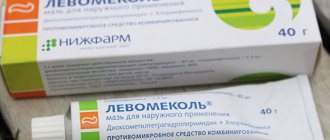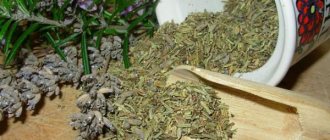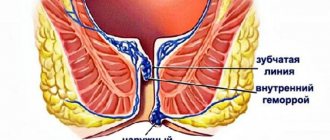Hemorrhoids are accompanied by varicose veins in the rectum and anus. To normalize the condition of blood vessels in medical practice, drugs are used that increase the tone of the veins. Many patients are interested in which veinotonic is best for hemorrhoids? It is impossible to answer this question unequivocally, because each remedy has its own characteristics and can act differently on a particular organism. In the article we will consider the mechanism of action of venotonics, their varieties and the most popular means of this group.
The most effective drugs for hemorrhoids.
November 29, 2022
4648
4.9
1
Content
- Symptoms of hemorrhoids
- How to choose a drug for hemorrhoids
- Top 7 best pills for hemorrhoids
- Troxerutin
- Vikasol
- Phlebodia 600
- Ginkor Fort
- Detralex
- Diosmin
- Pylex
Hemorrhoids are a very common disease that mainly affects middle-aged people. Hemorrhoids are inflammation, trauma and dilation of the veins surrounding the rectum. With this problem, a person feels itching in the anus, later pain, bleeding and prolapse of hemorrhoids. Hemorrhoids significantly reduce well-being and quality of life in general. Fortunately, in the arsenal of modern medicine there are many drugs to treat this disease: suppositories, ointments, creams, tablets. Today we will talk about venotonics and anti-inflammatory drugs - effective pills for hemorrhoids.
Symptoms of hemorrhoids
When hemorrhoids worsen, a person feels severe pain during bowel movements and even just when walking. Pain occurs due to fissures in the anal area or when hemorrhoids are pinched. The main signs of hemorrhoids are:
- itching or pain in the anus;
- blood during bowel movements;
- swelling and inflammation of tissues;
- prolapse of hemorrhoids (with external hemorrhoids).
Internal hemorrhoids can only be diagnosed if a doctor examines the rectum. With internal hemorrhoids, the nodes do not fall out of the anus and do not hurt, even if they are significantly enlarged.
Internal and external hemorrhoids
Photos from open sources
What is the most effective method of surgical treatment of hemorrhoids?
This is the wrong way to pose the question because at different stages of the disease different methods of radical therapy are used.
In particular, sclerotherapy is most effective for primary hemorrhoids that are detected in the early stages. Laser vaporization is more applicable for chronic, unadvanced forms of the disease. And the removal of hemorrhoids through hemorrhoidectomy, including the radio wave method using the Surgitron apparatus, is indicated for external prolapse of the nodes in the later stages.
Urologist-andrologist, urologist of the highest category Nizamutdinov Vadim Munirovich
How to choose a drug for hemorrhoids
Most often, a person waits until the advanced stage of the disease because he is embarrassed to go to a proctologist at the first symptoms. Usually this attitude towards one’s own health ends with surgery. But in the initial stages of hemorrhoids, special medications can help. How to choose the right medicine for hemorrhoids?
- Tendency to allergies.
If the drug contains a component to which you have been allergic in the past, discard this product. If you are prone to allergies, be sure to conduct a test on a small area of skin before using a local drug. - Pregnancy and breastfeeding.
Most medications for hemorrhoids are contraindicated in pregnant and breastfeeding women. But there are several remedies, the use of which can be discussed with your doctor. - Bleeding.
If significant bleeding occurs with hemorrhoids, you should immediately consult a doctor. If the bleeding needs to be stopped urgently, there are special hemostatic sponges and hemostatic drugs. - Inflammation.
Both external and internal hemorrhoids are usually accompanied by inflammation, swelling, blood in the stool, and even fever. Usually, tablets, suppositories, ointments, and creams based on NSAIDs (nonsteroidal anti-inflammatory drugs) or hormones help relieve inflammation and swelling of hemorrhoids. They reduce pain. Typically, inflammation is clearly expressed in external hemorrhoids, when the nodes fall out. In this case, medical attention is required.
Read also How to treat varicose veins: top 9 best ointments Varicose veins are easier to treat at the initial stage, so control the development of this disease. To treat varicose veins, there are effective ointments and gels that strengthen capillaries, relieve pain, swelling and inflammation.
Troxerutin
These pills for hemorrhoids comprehensively improve blood circulation, so they are suitable for treating not only hemorrhoids, but also varicose veins, thrombophlebitis, and chronic venous insufficiency. The active ingredient "Troxerutin" is a derivative of rutin (a natural bioflavonoid). The drug strengthens capillaries and improves vascular tone. "Troxerutin" reduces swelling and inflammation in hemorrhoids, the drug is used both for chronic hemorrhoids and during periods of exacerbation. Troxerutin capsules should be taken for about a month (1 capsule three times a day). This is a very affordable drug for the treatment of many vascular problems. Contraindications: stomach ulcer, first trimester of pregnancy. Side effects: headache, allergic reactions.
Troxerutin
Sopharma, Bulgaria; Vifitech/Vilar, Russia; Sintez OJSC, Russia; Pranapharm LLC, Russia; PJSC "Biokhimik", Russia; OZON, Russia
Phlebeurysm;
— chronic venous insufficiency with such manifestations as swelling, pain, heaviness in the lower extremities; — superficial thrombophlebitis, periphlebitis, phlebothrombosis; — postthrombotic syndrome; - post-traumatic edema, hematomas; — prevention of complications after vein operations; - haemorrhoids. from 22
5.0 1 review
1006
- Like
- Write a review
How to reduce the risk of venous thromboembolism when taking COCs
In the previous article, I told you about the main risks of taking oral contraceptives - deep venous thrombosis and pulmonary embolism. This is a life-threatening condition, which, of course, is better not to reach. Today we will discuss the main risk factors in order and see how they should be taken into account.
It's not possible - it's not possible
First, do not allow women who have contraindications to take COCs in accordance with the National Medical Criteria for Contraceptive Methods and WHO criteria (5th revision, 2015).1
Consider combinations of various factors that require caution
The benefit/risk ratio is carefully assessed in patients with several conditions/diseases for which COCs are not contraindicated, but require caution (2nd class of acceptability).
For example, age over 40 years and obesity with a BMI = 30 kg/m2 are not contraindications, but the combination of these two factors is quite explosive. The large-scale cohort study European Active Surveillance Study on Oral Contraceptives (EURAS-OC), conducted in 2000–2005, demonstrated the association of the risk of venous thromboembolism with age and weight: the older the patient and the higher her weight, the higher the likelihood of developing venous thrombosis.
Don't do pointless tests
In most cases, before starting COC use, the likelihood of venous thromboembolism cannot be predicted using tests. No coagulogram or D-dimer will allow you to assess how the blood coagulation system will behave.
It has now become very fashionable to conduct genetic studies to identify mutations in the genes of the hemostatic system before prescribing COCs to everyone. This, of course, is very interesting and exciting, but it is only necessary for those who have had early strokes, heart attacks or thromboembolism among their close relatives. In fact, mutations are quite rare and are not a 100% indicator that trouble will definitely happen.
By the way, about “genetic risk”. In recent years, a number of publications have appeared in the scientific literature indicating that carriers of blood groups II, III and IV have 2 times higher chances of getting venous thrombosis than carriers of the first group. This phenomenon was even called “non-zero blood type.” So, a non-zero blood group is a stronger risk factor for thrombosis than heterozygous polymorphisms of the II and V factor genes. But we do not deny the opportunity to take COCs to all carriers of blood group II (A) (and they are the majority in our population)!
Consider the “travel syndrome” (or “economy class syndrome”)
The connection between venous thrombosis and travel was first noted on flights across the Atlantic Ocean. It is now known that the risk lies not on the plane, but in a long-term forced sedentary position during flights or transfers lasting more than 6 hours2. In such situations, it is advisable for all COC users to use compression knitwear of the 1st class, choose an aisle seat, walk frequently, and do exercises for the calf muscles.
If you have surgery
Surgery itself is a serious thrombogenic factor. That is why COCs should be discontinued at least 2 weeks before planned operations, resuming use no earlier than 3 weeks after complete restoration of physical activity. Minor surgeries lasting up to 30 minutes do not increase the risk of thrombotic complications, but it is best to discuss this issue with your doctor3. Surgical treatment of varicose veins is not associated with a high risk of venous thromboembolism.
Avoid unnecessary “breaks”
It is absolutely no secret that the risk of thromboembolic complications is highest in the first months of taking COCs - during the period of adaptation to the drug. After just 3 months, the risk decreases significantly and by the end of the first year it becomes even lower than the population average.
I have always been terribly perplexed by the mysterious love for “rest breaks” while taking COCs. As soon as the body adapted to the drug, the risk of dangerous events decreased significantly. It would seem, take your pills and enjoy life. But no! It is imperative to take a break for 1-3 months, either after 6 months, or after 9, or after a year, forcing the body to go through the most difficult period of adaptation again and raise the risk of thrombosis to new heights4.
How the risk of venous thrombosis is reduced5
Incidence of venous thromboembolism vs duration of COC use. EURAS study.
Note The increased risk is mainly concentrated in the first year (more precisely, in the first 3 months) after starting use.
A “rest” from contraceptives for a woman in need of contraception is fraught not only with the onset of an unwanted pregnancy, but also with quite serious complications. In the end, it is absolutely unclear why the body, which is in a monotonous dormant state while regularly taking COCs, is so “tired” of it.
For the vast majority of healthy women of reproductive age, the well-established benefits of COCs outweigh the very low absolute risk of venous thromboembolism, but awareness of this and the use of appropriate precautions is certainly necessary.
1. World Health Organization. Medical Eligibility Criteria for Contraceptive Use, 4th edition. Geneva: WHO, 2009. WHO. Medical eligibility criteria for contraceptive use. Fifth edition. Geneva: WHO August 2015. https://www.who.int/reproductivehealth/publications/family_planning/MEC-5/en/ 2. Russian clinical guidelines for the diagnosis, treatment and prevention of venous thromboembolic complications (VTEC) // Phlebology. - 2015. - No. 4, issue 2. - P. 1–52. 3. Contraception and thrombosis. Ways to reduce thrombotic risk in women using COCs: information bulletin / G. B. Dicke, A. V. Solovyova; edited by V. E. Radzinsky. - M.: Editorial office of the magazine StatusPraesens, 2016. - 16 p. 4. Dinger JC, et al. The risk of venous thromboembolism in OC users: time patterns after initiation of treatment // Pharmacoepidemiol Drug Saf 2010; 19 (S1); S214-5. 5. Figure adapted from Suissa, et al. //Hum Reprod 2000; 15:817–21.
Oksana Bogdashevskaya
Photo istockphoto.com
Vikasol
These inexpensive hemorrhoid pills reduce bleeding during an exacerbation of the disease. The drug improves blood clotting in the shortest possible time and serves as a prevention of blood clots. "Vikasol" stimulates the production of prothrombin, thereby relieving inflammation. The active ingredient of the drug – sodium menadione bisulfite – improves the condition of blood vessels. “Vikasol” is an analogue of vitamin K, which is prescribed for various bleeding: uterine, regular nosebleeds, and stomach ulcers. Before using the drug, be sure to read the instructions.
Vikasol
OJSC Pharmstandard-Leksredstva, Russia
Vikasol is a synthetic (obtained artificially) water-soluble analogue of vitamin K. Participates in the formation of prothrombin.
Helps normalize blood clotting. If it is insufficient, hemorrhagic phenomena (bleeding) develop in the body. Hemorrhagic syndrome associated with hypoprothrombinemia; hypovitaminosis K (including with obstructive jaundice, hepatitis, liver cirrhosis, prolonged diarrhea); hemorrhagic disease of newborns; bleeding after wounds, trauma and surgery; in gynecology as part of the complex treatment of dysfunctional uterine bleeding not associated with organic pathology, with menorrhagia. As a specific antagonist for bleeding associated with taking indirect anticoagulants. III trimester of pregnancy (to prevent bleeding in newborns). from 11
5.0 1 review
546
- Like
- Write a review
Phlebodia 600
This drug for hemorrhoids contains diosmin, which relieves inflammation, has a lymphatic drainage effect and is a venotonic. Phlebodia 600 is prescribed to patients over 18 years of age for varicose veins and hemorrhoids. Tablets for hemorrhoids strengthen the walls of blood vessels, are allowed in the second and third trimester of pregnancy, and have very few contraindications. "Phlebodia 600" copes well with thrombosis of hemorrhoids. Among the “side effects” of long-term use of the drug are urticaria, headaches, heartburn, constipation or diarrhea. The only drawback of this drug for hemorrhoids is its high price.
Phlebodia 600
Innotera Chouzy, France
As part of complex therapy: - to eliminate the symptoms of lymphovenous insufficiency of the lower extremities: a feeling of heaviness or fatigue in the legs, pain;
— additional treatment for microcirculation disorders; - symptomatic treatment of acute hemorrhoids. from 633
5.0 1 review
616
- Like
- Write a review
How to insert correctly
Before using rectal suppositories, you must take a hygienic shower, paying special attention to cleansing the perianal area.
It is recommended to insert suppositories once a day after defecation in the morning or evening. If constipation occurs, it is recommended to take a mild, herbal laxative.
Attention! Most suppositories for hemorrhoids have side effects and contraindications, so their use requires mandatory consultation with a specialist. The doctor will select the most suitable drug for you, which will help you quickly cope with the disease.
Ginkor Fort
These capsules for hemorrhoids improve the condition of the venous vessels and help the lumps to dissolve. On the third day of taking the drug, there is a significant improvement in the condition: the tone of the anal ring is normalized and the pain goes away. "Ginkor Fort" is suitable for the treatment of both chronic and acute hemorrhoids. This remedy is a venotonic, which contains: troxerutin, ginkgo biloba extract, etc. Troxerutin relieves swelling and works as a prophylaxis for hemorrhoids. Ginkgo biloba reduces inflammation, the remaining components prevent infections. Among the disadvantages of Ginkor Forta is its high cost, which, nevertheless, fully justifies the effectiveness of the drug.
Ginkor fort
IPSEN (Bofur Ipsen), Ukraine
Disorders of the venous circulation of the lower extremities, manifested by a feeling of heaviness, paresthesia, pain in the legs;
chronic hemorrhoids. from 404
5.0 1 review
622
- Like
- Write a review
Types of medications
Venotonics for hemorrhoids come in several types. Drugs are classified depending on the form of release and their composition. Products intended to restore vascular tone come in the form of ointments, gels and tablets for internal use. According to their composition, venotonics are:
- preparations including bioflavonoids, such as diosmin, rutin, hesperidin. These medications have a powerful systemic effect and have a positive effect on the condition of blood vessels. Representatives of this group include tablets Flebodia, Vazoket, Venarus, Detralex;
- medications that contain a synthetic analogue of rutin. These medications are used for acute hemorrhoids, accompanied by poor circulation, acute pain, and inflammation. These include Ascorutin, Troxevasin, Troxerutin;
- products based on pentoxifylline. Drugs in this group have a strong effect and have many side effects, so it is recommended to use them strictly as prescribed by a doctor. In this category Trental, Vazonit;
- medicines containing herbal substances. These products contain sage, horse chestnut, tea tree extract, mint and other natural ingredients. These include Aescusan, Ginkor Fort.
The attending physician selects medications individually for each patient, depending on the course of hemorrhoids, its degree and the individual characteristics of the patient’s body.
Detralex
“Detralex” treats hemorrhoids and varicose veins; these tablets contain diosmin, hesperidin and flavonoids. Tablets for hemorrhoids strengthen blood vessels, prevent blood from stagnating and improve the elasticity of veins. If hemorrhoids are acute, you need to drink 6 tablets per day (for four days), if chronic - 2 tablets per day (course of treatment - several months). Contraindications include individual intolerance and breastfeeding. With long-term treatment with Detralex, nausea, general weakness, diarrhea, and skin rash are possible. It is noteworthy that pregnant women can also be treated with Detralex. The only disadvantage of the drug is its high cost.
Detralex
SERVIER (Servier), France
Diosmin, the active ingredient in Detralex, belongs to the group of venotonics and angioprotectors.
As a result of the action of the drug, the tone of the veins increases, which means they become less elastic and distensible, hemodynamics improve, and the phenomena of stasis decrease. Detralex prevents the adhesion of leukocytes to the endothelial wall, as a result of which the damaging effect of inflammatory mediators on the valve leaflets of the veins is reduced. from 1256
5.0 2 reviews
5236
- Like
- Write a review
Diosmin
These pills for hemorrhoids perfectly tone the venous walls and stimulate the outflow of lymph. You need to take Diosmin in a course (no more than a week). The drug is prescribed to those who have problems with the veins. This is an angioprotector that works as a prevention of venous pathologies. The active substance of the drug is diosmin. In just 7 days of treatment with Diosmin, the problem of the initial stage of hemorrhoids goes away, and improvement occurs already on the second day of treatment. Be sure to read the instructions for contraindications.
Diosmin
Kanonpharma Production (Canon), Russia; Vertex CJSC, Russia; JSC "Organika", Russia
Varicose veins of the lower extremities (elimination of symptoms);
— chronic lymphovenous insufficiency of the lower extremities (elimination of symptoms); - acute hemorrhoids (in complex therapy to relieve symptoms); - microcirculation disorders (for example, with idiopathic edema). from 299
426
- Like
- Write a review
Read also How to treat gastritis: 8 best drugs The best drugs for gastritis: reducing acidity, eliminating excess acid and fighting Helicobacter pylori.
What are venotonics?
Venotonics (phlebotonics) are drugs that improve the condition of the vascular wall.
They have two main effects:
Venotonic – increase tone, i.e. tension of the venous wall, and due to this they reduce the distensibility of the veins and prevent stagnation of blood in the veins.
Angioprotective - increase the resistance of capillaries to damage, improve microcirculation, and therefore nutrition of the vascular wall.
Venotonic drugs are used mainly for venous diseases and for the treatment of acute hemorrhoids, because in this case, the venous outflow is also impaired, but only through the veins of the rectum.
Pylex
"Pileks" is one of the best pills for hemorrhoids, the cause of which is dilated veins of the rectum. Almost immediately after the start of treatment, the burning sensation and pain disappear. "Pylex" relieves inflammation and improves vein tone. Excellent results in the treatment of hemorrhoids are shown by the combined use of this drug in the form of tablets and ointments. "Pylex" is also used for varicose veins and thrombophlebitis. The drug contains barberry root extract, neem leaf powder, mumiyo powder, commiphora resin. All these components improve the functioning of the gastrointestinal tract, normalize stool, remove toxins, relieve inflammation, help cell regeneration, improve the elasticity of blood vessels, and remove congestion. Before using Pilex, be sure to consult your doctor.
Pylex
Himalaya Herbals, India
Pylex tablets are a multicomponent herbal remedy, the effectiveness of which is due to the complex action of its components. The medicinal plants that make up Pylex tablets have anti-inflammatory, decongestant, venotonic, wound-healing, membrane-stabilizing, antimicrobial and antioxidant effects. Pilex - ointment for the treatment of hemorrhoids and anal fissures for topical use. Combined herbal preparation. The composition of the active substances includes extracts and powders of medicinal plants: Mimosa pudica, Eclipta alba, Chinese twig, Calendula officinalis which help reduce pain, bleeding and inflammation in the area of hemorrhoids, accelerate the healing process of anal fissures. Camphor improves microcirculation, thereby having an antiseptic, local analgesic and anti-inflammatory effect.
306
- Like
- Write a review











